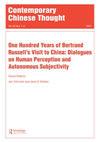One Hundred Years of Chinese Studies on Philosophy of Bertrand Russell: Continuities, Retrospectives, and New Directions
IF 0.4
3区 哲学
0 ASIAN STUDIES
引用次数: 0
Abstract
The years 2020 and 2021 mark a centenary since the great British polymath Bertrand Russell visited China. One hundred years after the visit of this preeminent British philosopher to China, studies in modern Chinese intellectual history are still directly or indirectly concerned with the consequences this trip had for the Chinese scientific, philosophical, and sociopolitical discourse in the Republican era and thereafter. With his personal and scholarly integrity, his polymathic erudition, progressive social ideas, and unbending fervor in his endeavors for freedom of thought and personal choice, Russell left an enduring imprint on numerous aspects of Chinese modern thought and society. Although, over time, the character and the extent of Russell’s influence on Chinese philosophical discourse have reached both extremes of recognition and rejection, its deep entanglement with the very roots of Chinese modernity guaranteed his philosophy a sustained influence and presence in the content of contemporary Chinese philosophical currents. Tested and shaped by the ebbs and flows of Chinese social, political, and intellectual trends in the last 100 years, Chinese intellectuals’ interest in Russell’s philosophy went through different, and at the time directly opposite, phases: from its (1) initial establishment in the May Fourth period, to (2) establishment of Russell’s philosophy and logic in Chinese academia in the 1930s, to (3) its ideological denunciation in the first decades of the People’s Republic (PRC, 1949–), down to (4) its (predominantly retrospective) rehabilitation in the 1980s and (5) its ultimate reestablishment at the heart of current Chinese philosophical trends. In a manner typical for the majority of large-scale and swift, especially politically induced, intellectual turns in the 20th century, the transitions between the later stages were characterized or accompanied by a strong retrospective dimension, which aimed at establishing a new relationship between the nature and content of his philosophy, on one side, and the political identity of past and present Chinese philosophers, on the other. Because each of the major ebbs and flows in Chinese scholarship on Russell’s philosophy was founded as a profoundly historical event, in which the wefts of the past were replaced by those pertaining to the new realities, a certain degree of continuity was retained throughout the studies of Russell’s philosophy, which thus remained deeply embedded in the tissue of the long warp of Chinese history. On the other hand, a high level of continuity was also retained by means of traditionally strong student–teacher relationships. At the same time, past and contemporary retrospectives usually marked the entrance of a new generation of中国哲学研究百年:连续性、回顾性与新方向
2020年和2021年是伟大的英国博学家伯特兰·罗素访华一百周年。在这位杰出的英国哲学家访问中国一百年后,中国现代知识史研究仍然直接或间接地关注这次访问对民国时期及其后的中国科学、哲学和社会政治话语的影响。罗素以其个人和学术的品格、渊博的学识、进步的社会思想以及对思想自由和个人选择的不懈追求,在中国现代思想和社会的许多方面留下了不可磨灭的印记。尽管随着时间的推移,罗素对中国哲学话语的影响的性质和程度已经达到了承认和拒绝的极端,但其与中国现代性根源的深刻纠缠保证了他的哲学在当代中国哲学潮流的内容中持续的影响和存在。中国知识分子对罗素哲学的兴趣经历了不同的、当时正好相反的阶段:从(1)五四时期的初步确立,到(2)20世纪30年代罗素哲学和逻辑学在中国学术界的确立,到(3)它在中华人民共和国成立的头几十年(1949年)的意识形态谴责,到(4)它在20世纪80年代(主要是回顾性的)复兴,以及(5)它在当前中国哲学潮流的核心最终重建。以20世纪大多数大规模、迅速、特别是政治引发的知识转向的典型方式,后期之间的转变具有强烈的回顾性,旨在在他的哲学的性质和内容之间建立一种新的关系,一方面,以及中国过去和现在哲学家的政治身份。由于中国学术界对罗素哲学的每一次重大波折都是作为一个深刻的历史事件而建立的,在这个历史事件中,与新现实有关的东西取代了过去的东西,因此在罗素哲学的研究中保持了一定程度的连续性,它深深地植根于中国历史的长河中。另一方面,传统上牢固的师生关系也保持了高度的连续性。与此同时,过去和当代的回顾通常标志着新一代
本文章由计算机程序翻译,如有差异,请以英文原文为准。
求助全文
约1分钟内获得全文
求助全文
来源期刊

CONTEMPORARY CHINESE THOUGHT
Multiple-
CiteScore
0.10
自引率
0.00%
发文量
0
期刊介绍:
This wide ranging journal is essential reading for anyone who wants to understand the diverse themes and influences that shape Chinese thought today. It features translations of the most current and influential Chinese writings on all aspects of philosophical endeavor, from theoretical essays on systems to studies of China"s cultural and religious development, from interpretations of the Chinese classics to exegeses on Marxist thought.
 求助内容:
求助内容: 应助结果提醒方式:
应助结果提醒方式:


